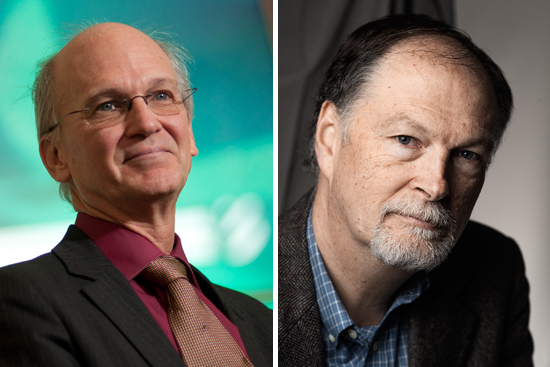Two Guggenheims Will Fuel Humanities Research
James McCann and James Winn awarded fellowships

James A. Winn (left) and James C. McCann of the College of Arts & Sciences are among 181 scholars, artists, and scientists chosen as recipients of a Guggenheim Fellowship. Winn photo by Kalman Zabarsky. McCann photo by Vernon Doucette
Two College of Arts & Sciences professors specializing in the humanities are taking a temporary break from campus, with help from the John Simon Guggenheim Memorial Foundation. Guggenheim fellowships, often characterized as midcareer awards, are grants of 6 to 12 months given to scholars who have demonstrated exceptional capacity for productive scholarship or exceptional creative ability in the arts.
James C. McCann, a history professor studying malaria in Ethiopia, and James A. Winn, an English professor examining the life of Queen Anne through her patronage of the arts, are among 181 scholars, artists, and scientists chosen in April from a field of nearly 3,000 applicants as recipients of a Guggenheim Fellowship.
“The national competition for Guggenheim Fellowships is always incredibly strong, so to even have one Fellow, let alone two this year within our faculty, speaks to the extraordinary depth of Boston University’s humanities scholarship,” says Jean Morrison, University Provost. “From history to literature, Professors McCann and Winn are widely published, widely respected scholars and teachers who are leaders in their fields and continue each year to produce extensive original research. We are extremely proud of their accomplishment and to count them among our faculty and community here at BU.”
Both McCann and Winn say the fellowship is the best-known academic honor they’ve received, and both say they sought out their wives to give them the news first.
“It’s nice to be able to tell people who matter,” says McCann, who is the director ad interim of the Frederick S. Pardee Center for the Study of the Longer-Range Future and associate director for development at the African Studies Center. He recalls walking down the hallway from his office to tell his wife, Sandi, who also works at the African Studies Center.
McCann is headed to Ethiopia, where he will concentrate on his latest book, Like Bees in a Smoked Hive: Landscapes of Malaria, Landscapes of History, a nonfiction work about people living with malaria. He is the author of several books, among them Maize and Grace: Africa’s Encounter with a New World Crop (2005). He will live in the capital city of Addis Ababa and also in a community near the source of the Blue Nile.
Malaria is a local problem that won’t be solved with a vaccine, he says, but rather a combination of long-term remedies, including economic development, mosquito control, and drug distribution. “If you think you’ll find a global solution, you’ll be disappointed,” says McCann, who has already poured five years of field study, archival research, and laboratory analysis into his current project.
He will also spend some time in Germany as the Ludolf Professor at the University of Hamburg. Also a Fulbright fellow, McCann reports that he has already enjoyed one benefit of the fellowship’s prestige—a call from a commercial literary agent in New York.
Winn is a William Fairfield Warren Distinguished Professor, director of BU’s Center for the Humanities, and a former chair of the CAS English department. He is best known for his 1989 biography of John Dryden, John Dryden and His World, which won the British Humanities Council Prize and the Yale University Press Board of Governors’ Award. His most recent book is The Poetry of War.
Planning to tap the Manuscripts Reading Room at the British Library and the National Archives, Winn will go to London to research his current book project. With the working title Queen Anne Style: English Culture and Politics under the Last Stuart Monarch, the book looks at the monarch’s life through her knowledge and patronage of the arts. Queen Anne, says Winn, himself an accomplished flutist, played the guitar and harpsichord, excelled at dance and acting, embraced opera and poetry, spoke French fluently, and was a discerning critic of painting and architecture. “Her reign saw a flowering of all those arts,” he says, adding that artists from the era were aware of her arts savvy and created works knowing that she would appreciate their subtleties and nuances.
Winn’s London research, which is also supported by the National Endowment for the Humanities, will focus on Queen Anne’s reign from 1702 to 1714, a period, he says, that is “thickly documented,” from Treasury Board meeting minutes to newspaper accounts of the queen’s daily affairs.
“This is England,” he says, “the country where they never threw anything away.”
Comments & Discussion
Boston University moderates comments to facilitate an informed, substantive, civil conversation. Abusive, profane, self-promotional, misleading, incoherent or off-topic comments will be rejected. Moderators are staffed during regular business hours (EST) and can only accept comments written in English. Statistics or facts must include a citation or a link to the citation.